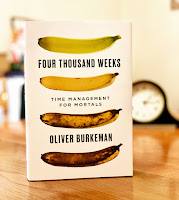[Oliver Burkeman. Four Thousand Weeks: Time Management for Mortals. Toronto: Allen Lane, 2021.]
An anti-productivity book, of sorts. In most books that are either directly or indirectly about how we individually make use of our time, the goal is to enable the reader to do more. Now, I don't actually often read that sort of book, at least in its most blatant neoliberal-cult-of-productivity manifestation. But I have been known to read more thoughtful or critical books that are at least somewhat related, and at this time of year I will often read a book about writing process, which isn't reducible to productivity but does have to do with...perhaps writing more, and certainly being more able to write. And if you were to magically get access to the dozens and dozens of notebooks I've filled over the last 25 years, you would find that the majority of the ink spilled therein is not recording salacious gossip or deep thoughts or radical politics, but highly repetitive neurosis focused on how I do, can, and should spend my time. So it is definitely a topic of great interest to me.This book takes the position that, while there might be immediate instrumental value in particular circumstances to trying to pack more into a day or a week, it is a fundamental mistake to think that attempting to do so will solve the underlying drive that brings us to think about such things. It is premised on the inescapability of human finitude. We get, if we're lucky, 4000 weeks in our lives. Most things that we could do, most things that we want to do, we will never get to do. This is sad, even tragic. But, while it is certainly experienced inequitably in certain respects, it is a fundamental truth of being alive. The book starts from this insight, explores what it means and how it relates to conventional understandings of productivity, and makes a few tentative suggestions about what to do about it. There's more to it, but he suggests that the first step is to just accept that this is the reality, and that such acceptance is an important starting point for making decisions about whatever time we *do* have – and the book recognizes that some people have much, much more control of their time than others – in ways that reflect our actual values and desires. Trying to do more than a human can possibly do will just make us miserable. Making our peace with our limits is no guarantee of happiness, but it does put us in a better position to make what we can of our limited time. And it offers a few more specific ways to think about it all as you bring it down to earth in your own life.
So...I like the fundamental insight here. I think it's important. I think it points me towards healthier ways of relating to my time-use neurosis, and towards making decisions about how my highly self-directed life of writing and other sorts of making should be organized – there aren't any big decisions happening right away, but given the stage my book project is at, some should start to become more relevant before the end of 2022. For me, personally, this was a very useful book, and some of its ideas will be with me for years to come.
That said, I really think this book would have been better as a long article. I think there were chapters illustrating particular ideas that could just as effectively been a paragraph or three. I think towards the end of the book, and in smaller ways earlier on, it drifts away from the core insight about human finitude towards talking about other aspects of what might philosophically be thought of as living a good life, in a way that just wasn't as interesting to me. There was also occasional content brought in to illustrate examples that I disagreed with or disliked in some way. And while recognizing the inequitable distribution of control over our time is important, I think insights about how to change our relationship to finitude as individuals are most usefully taken up as part of a vision for changes in the social. So as a document, I think it could have been implemented better – or, at least, it's not what I would've written, for whatever that's worth. But if you, like me, are in a constant state of worry about how you spend your time, and how to find ways to do the things that you most want to be doing, it's a book worth reading.






No comments:
Post a Comment